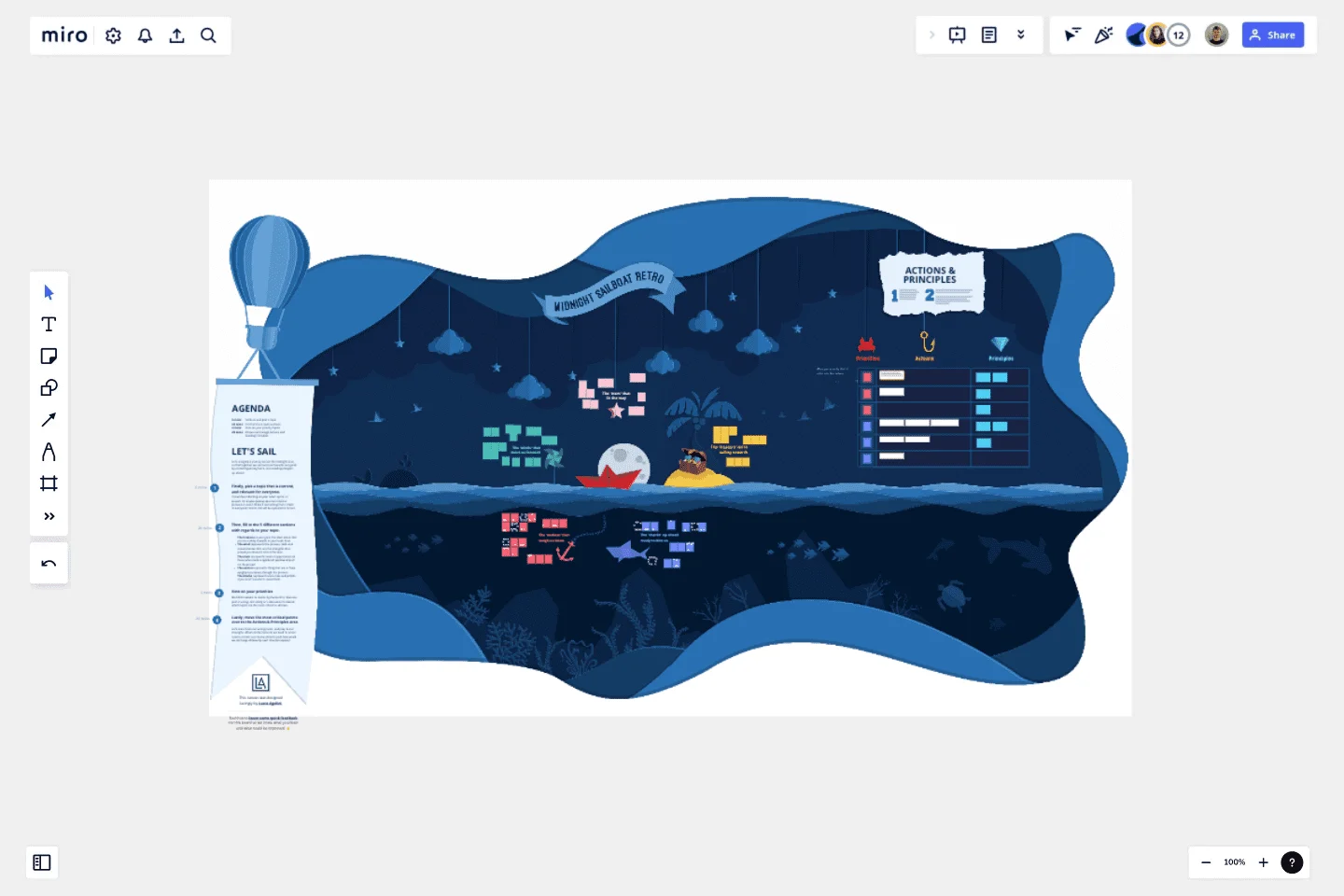Midnight Sailboat Retrospective
Transport your team to the delightful World of Papercraft, where we will sail the midnight seas together, and use our time riding tides to reflect on where we've done well and what we could improve for next time.
For who and for when?
This template is a perfect companion for teams who want to learn from recent sprints, projects, events or processes, and create actionable tasks and guiding principles to keep the future compass steady.
Why use this template?
This template is designed to take you on a visual experience that's easy to use, fun to explore, and most importantly it's actionable - so you can fully let go of your heaviest anchors and never meet the same sharks twice!
Credits
Cudos to the original creator of the Sailboat exercise, who devised a method so popular, it is impossible to identfy the first edition in amongst all the remakes. Good job! 🎉
This template was created by Lucie Agolini
Get started with this template right now.
PI Planning Template
Works best for:
Agile Methodology, Strategic Planning, Software Development
PI planning stands for “program increment planning.” Part of a Scaled Agile Framework (SAFe), PI Planning helps teams strategize toward a shared vision. In a typical PI planning session, teams get together to review a program backlog, align cross-functionally, and decide on the next steps. Many teams carry out a PI planning event every 8 to 12 weeks, but you can customize your planning schedule to fit your needs. Use PI planning to break down features, identify risks, find dependencies, and decide which stories you’re going to develop.
Agile Product Roadmap
Works best for:
Roadmap, Planning, Mapping
The Agile Product Roadmap template enables teams to visualize and communicate the strategic direction of their product development in an agile environment. It allows for flexibility and adaptation to changing requirements while providing a clear overview of priorities and timelines. By incorporating feedback loops and iterative planning, teams can ensure alignment with stakeholder expectations and deliver value incrementally.
Lean Coffee Template
Works best for:
Agile Methodology, Product Management, Meetings
What makes a great meeting (other than donuts)? It’s appreciating everyone’s skills, resources, and time by making the very best use of them. That’s what the Lean Coffee approach is designed to do. Great for team brainstorms and retrospectives, Lean Coffee breaks the meeting into three basic stages: what to discuss, what’s being discussed, and what’s been discussed. This template makes it easy for you to collect sticky notes and to update the columns as you go from topic to topic.
Event Storming
Works best for:
Agile
Event Storming is a collaborative workshop technique for exploring complex business problems and modeling solutions. It fosters communication, uncovers dependencies, and aligns stakeholders by visualizing the flow of events in a system. This template empowers teams to map out processes, identify bottlenecks, and iterate towards more efficient solutions, driving continuous improvement and innovation.
User Story Map Template
Works best for:
Marketing, Desk Research, Mapping
Popularized by Jeff Patton in 2005, the user story mapping technique is an agile way to manage product backlogs. Whether you’re working alone or with a product team, you can leverage user story mapping to plan product releases. User story maps help teams stay focused on the business value and release features that customers care about. The framework helps to get a shared understanding for the cross-functional team of what needs to be done to satisfy customers' needs.
Retrospective - Summer
Works best for:
Retrospectives, Agile Methodology, Meetings
The Retrospective - Summer template offers a seasonal and themed approach to retrospectives, perfect for capturing the spirit of summer. It provides elements for reflecting on achievements, experiences, and goals amidst the summer backdrop. This template enables teams to relax, recharge, and recalibrate their efforts for the upcoming season. By promoting reflection and rejuvenation, the Retrospective - Summer empowers teams to celebrate successes, learn from setbacks, and embark on new adventures with renewed energy and enthusiasm effectively.
